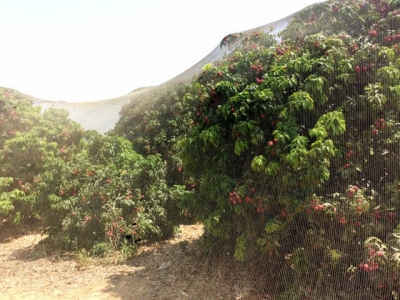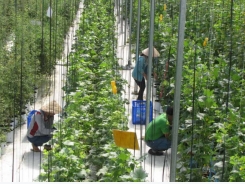Bac Giang studies high-tech agriculture in Israel

Israel is a small country that lies at the junction of three continents Europe, Asia and Africa. Despite severe weather conditions and poor soil with deserts and semi-deserts dominating its land, Israel is renowned for agriculture export thanks to the application of advanced technology in farming.
The litchi growing area is covered by an insect protection net.
We were astonished at Israel’s high-tech agricultural models although they have been too popular through media. Our first destination was a litchi cultivation area in Kamon where litchis are well protected from insects and harsh weather and watered by the drip irrigation system.
Tasting the fruit, we were completely impressed by its succulent taste which borders on that of Bac Giang litchi, however, the Israeli fruit and seed are much smaller. Especially, each kilogram of Israeli litchis is sold at more than 100,000 VND (4.4 USD), higher than the price of the Vietnamese fruit.
A working delegation from Bac Giang province is studying hi-tech agriculture in Israel, including Vice Chairman of the provincial People’s Committee Duong Van Thai, Deputy Director of the provincial Department of Science and Technology Nguyen Van Xuat, and Deputy Director of the provincial Department of Planning and Investment Nguyen Cuong, and representatives from relevant agencies.
Agricultural production in greenhouses is common in Israel. The outstanding thing we witnessed for the first time that tomato productivity is 500 tonnes per hectare per crop thanks to good variety production and greenhouse cultivation. Currently, the country is deploying greenhouses to grow some kinds of ornamental trees and perennial orchards, raise poultry and conduct high-tech aquaculture in the desert.
Covered by desert and semi-desert terrain, Israel regards water as its national resource, or called “white gold”. Water saving is a focus in all agricultural activities in the country. It is easy to see the drip irrigation networks with small water pipelines to each tree.
The watering system, which is controlled by computers, can automatically open or close its valves depending on the moisture of tree roots. Israeli people also produced plastic tray to collect water from the air, which helps reduce the amount of water used in the plantation by 50 percent. Desalination for both land and water has been successfully applied in the country.
Apart from becoming the world’s leading country in saving water in agricultural production, Israel has gained many other achievements and owned state-of-the-art technology in agricultural development.
Leaving the production area, we continued to arrive at a processing and preserving factory of farm produce using Jujan technology. With this technology, the litchis could be kept in four months with taste as fresh as harvested. Apart from litchis, Israel has the equipment to preserve other agricultural products for exports with the best quality. For example, the preservation of potatoes without the use of chemicals could significantly reduce the rate of germination, while maintaining the use of pomegranate for four months with original nutritional content.

A working delegation of the province is visiting a production and preservation line of lychees in Israel.
Most of the stages from cultivation to harvest, preservation and sale of products in Israel are applied with information technology. Farmers can manage all production stages for thousands of hectares of cultivating areas without working in the field.
Despite not having a chance to visit many places, through meeting with scientists and farm owners, we realized that to gain the current achievements, Israel has adopted a number of breakthrough measures, especially the strong will and high determination of authorities and people. The key to the successful hi-tech agriculture is science – which makes up 95 percent while only 5 percent is labor. Added to this is the close connectivity between the State, scientists, farmers and businesses. All connected to seek solutions to addressing agricultural issues.
Related news
Tools

Phối trộn thức ăn chăn nuôi

Pha dung dịch thủy canh

Định mức cho tôm ăn

Phối trộn phân bón NPK

Xác định tỷ lệ tôm sống

Chuyển đổi đơn vị phân bón

Xác định công suất sục khí

Chuyển đổi đơn vị tôm

Tính diện tích nhà kính

Tính thể tích ao



 Effectiveness of VietGAP standard in agricultural production
Effectiveness of VietGAP standard in agricultural production  Businesses short of land fund to develop hi-tech…
Businesses short of land fund to develop hi-tech…